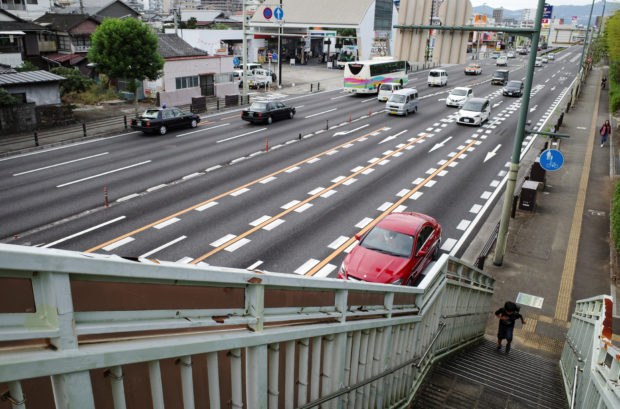Japan may ban sale of new gasoline-powered vehicles by mid-2030s — media

FILE PHOTO: A schoolboy walks up the overhead bridge along a traffic junction in Beppu, Japan October 8, 2019. Picture taken October 8, 2019. REUTERS/Edgar Su
TOKYO — Japan’s government is considering abolishing sales of new gasoline-engine cars by the mid-2030s in favor of hybrid or electric vehicles in line with a global shift from traditionally powered cars, public broadcaster NHK reported on Thursday.
The move would follow Prime Minister Yoshihide Suga’s pledge in October for Japan to slash carbon emissions to zero on a net basis by 2050 and make the country the second G7 nation to set a deadline for phasing out gasoline vehicles in a little over two weeks.
Japan’s industry ministry will map out a plan by the year-end, chief government spokesman Katsunobu Kato told a news conference on Thursday.
The ministry is considering requiring all new vehicles to be electric cars including hybrid vehicles, NHK reported earlier, adding the ministry would finalize a formal target following expert-panel debates as early as the year-end.
In Japan, the share of electricity vehicles is expected to increase to 55% in 2030, Boston Consulting Group said in a report on prospects for battery-powered cars.
Globally, “the speed of expansion of the share of electric vehicles will accelerate due to the fact that battery prices are falling more rapidly than previously expected,” Boston Consulting said in the report.
The United Kingdom will ban sales of new petrol and diesel powered cars and vans from 2030, bringing forward the phase-out date by five years in what Prime Minister Boris Johnson called a “green revolution.”
Japan, China and South Korea recently announced firm targets to end net emissions of carbon, which has given momentum for companies and banks to push for cutbacks to keep global warming in check.
Policies and investments in the next few years will be crucial to setting the pathways to carbon neutrality, climate activists and energy transition strategists all agree.